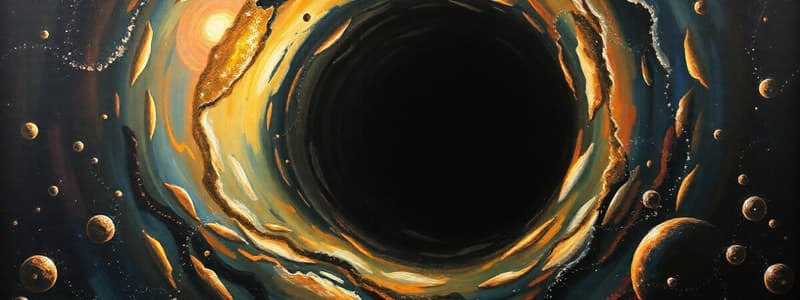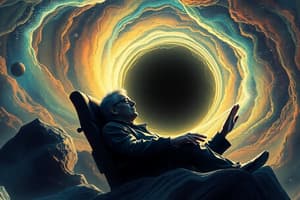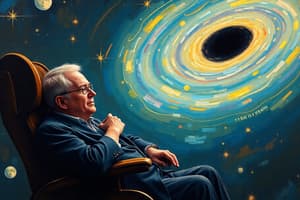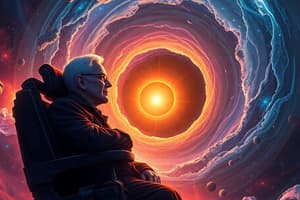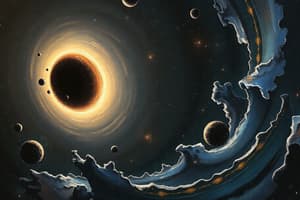Podcast
Questions and Answers
What specific astronomical phenomenon initially sparked Stephen Hawking's interest in black holes?
What specific astronomical phenomenon initially sparked Stephen Hawking's interest in black holes?
- The theoretical prediction of gravitational waves.
- The observation of X-ray binaries near star-forming regions. (correct)
- The confirmation of the existence of dark matter.
- The discovery of pulsars in 1967.
What was the primary subject of Stephen Hawking's doctoral dissertation?
What was the primary subject of Stephen Hawking's doctoral dissertation?
- The expansion of the universe from a singularity. (correct)
- The properties of contracting universes.
- The formation of black holes from supernovae.
- The characteristics of X-ray binaries.
How did Karl Schwarzschild contribute to the scientific understanding of black holes?
How did Karl Schwarzschild contribute to the scientific understanding of black holes?
- He coined the term "black hole."
- He theorized their existence based on Einstein's theory. (correct)
- He first detected X-ray binaries.
- He proved that black holes emit heat radiation.
What groundbreaking discovery did Stephen Hawking make regarding black holes in 1974?
What groundbreaking discovery did Stephen Hawking make regarding black holes in 1974?
What aspect of Roger Penrose's work influenced Stephen Hawking's understanding of black holes?
What aspect of Roger Penrose's work influenced Stephen Hawking's understanding of black holes?
Which prestigious academic position did Stephen Hawking hold at Cambridge University?
Which prestigious academic position did Stephen Hawking hold at Cambridge University?
In what year did Stephen Hawking lose his ability to speak naturally, requiring a speech synthesizer?
In what year did Stephen Hawking lose his ability to speak naturally, requiring a speech synthesizer?
Which condition was Hawking diagnosed with in 1963?
Which condition was Hawking diagnosed with in 1963?
When did Hawking publish his book: A Brief History of Time
When did Hawking publish his book: A Brief History of Time
What was the significance of the discovery of "X-ray binaries"?
What was the significance of the discovery of "X-ray binaries"?
Flashcards
Stephen Hawking
Stephen Hawking
Renowned physicist known for his work on black holes and cosmology.
Black Hole
Black Hole
An area in space where gravitational pull prevents anything, including light, from escaping.
Singularity
Singularity
A point in space-time with infinite density, formed at the center of black holes.
Roger Penrose
Roger Penrose
Signup and view all the flashcards
ALS
ALS
Signup and view all the flashcards
Hawking Radiation
Hawking Radiation
Signup and view all the flashcards
Properties of Expanding Universes
Properties of Expanding Universes
Signup and view all the flashcards
Lucasian Professor of Mathematics
Lucasian Professor of Mathematics
Signup and view all the flashcards
X-ray Binaries
X-ray Binaries
Signup and view all the flashcards
A Brief History of Time
A Brief History of Time
Signup and view all the flashcards
Study Notes
Stephen Hawking
- Renowned theoretical physicist, explored "black holes" and the universe's origins
- Popularized science, making complex concepts accessible to millions
- Born in London, 1942, died 2018
- Developed a speech synthesizer to communicate after losing voice due to ALS (amyotrophic lateral sclerosis)
Hawking's Life and Work
- Studied at Cambridge, earned PhD in cosmology
- Diagnosed with ALS in 1963, confined to wheelchair from 1969
- Contributed significantly to understanding of black holes and the universe's beginning
- Collaborated with Roger Penrose to prove that gravitational singularities exist
Black Holes
- Term "black hole" coined in 1967
- Karl Schwarzschild hypothesized existence earlier
- Astronomers observed X-ray binaries, evidence of black holes
- Hawking researched black holes in his doctoral thesis
- Black holes could yield insights into the universe's creation
- Studied work of Penrose, suggesting that a large star's demise leads to a point of infinite density, singularity in space-time
Major Accomplishments
- Wrote his PhD thesis on expanding universes
- Proved existence of gravitational singularities
- Discovered that black holes emit heat and evaporate (quantum theory, 1974)
- Became Cambridge's Lucasian Professor of Mathematics
- Published A Brief History of Time, becoming a global phenomenon
- Achieved cultural stardom
Studying That Suits You
Use AI to generate personalized quizzes and flashcards to suit your learning preferences.
